Psychology Annotated Bibliography: Doctoral Assignment, GCU
VerifiedAdded on 2023/06/09
|9
|1955
|67
Annotated Bibliography
AI Summary
This annotated bibliography provides concise summaries and critical analyses of five key journal articles in the field of psychology. The articles cover a range of topics including self-determination theory, motivation (intrinsic and extrinsic), cognitive-affective systems theory of personality, radical behaviorism's perspective on cognitive psychology, and the consequences of attaining different aspirations in post-college life. Each entry includes the complete citation, a brief overview of the authors' backgrounds and expertise, a summary of the article's main arguments, key findings, and limitations. The bibliography highlights the contributions of various scholars to understanding motivation, personality, and the interplay between cognitive processes and behavior. The articles selected provide a comprehensive overview of the current research landscape within the field of psychology.
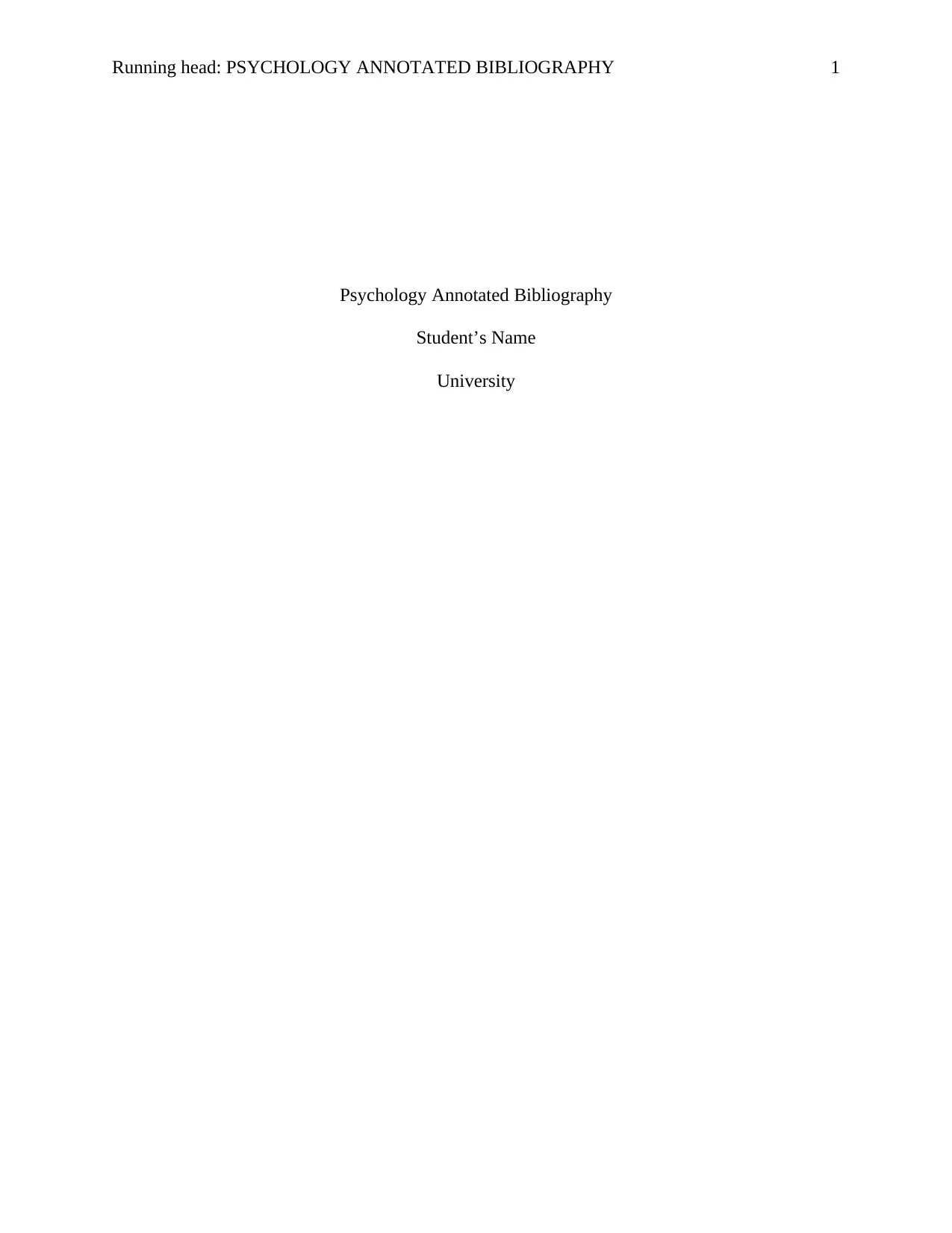
Running head: PSYCHOLOGY ANNOTATED BIBLIOGRAPHY 1
Psychology Annotated Bibliography
Student’s Name
University
Psychology Annotated Bibliography
Student’s Name
University
Paraphrase This Document
Need a fresh take? Get an instant paraphrase of this document with our AI Paraphraser
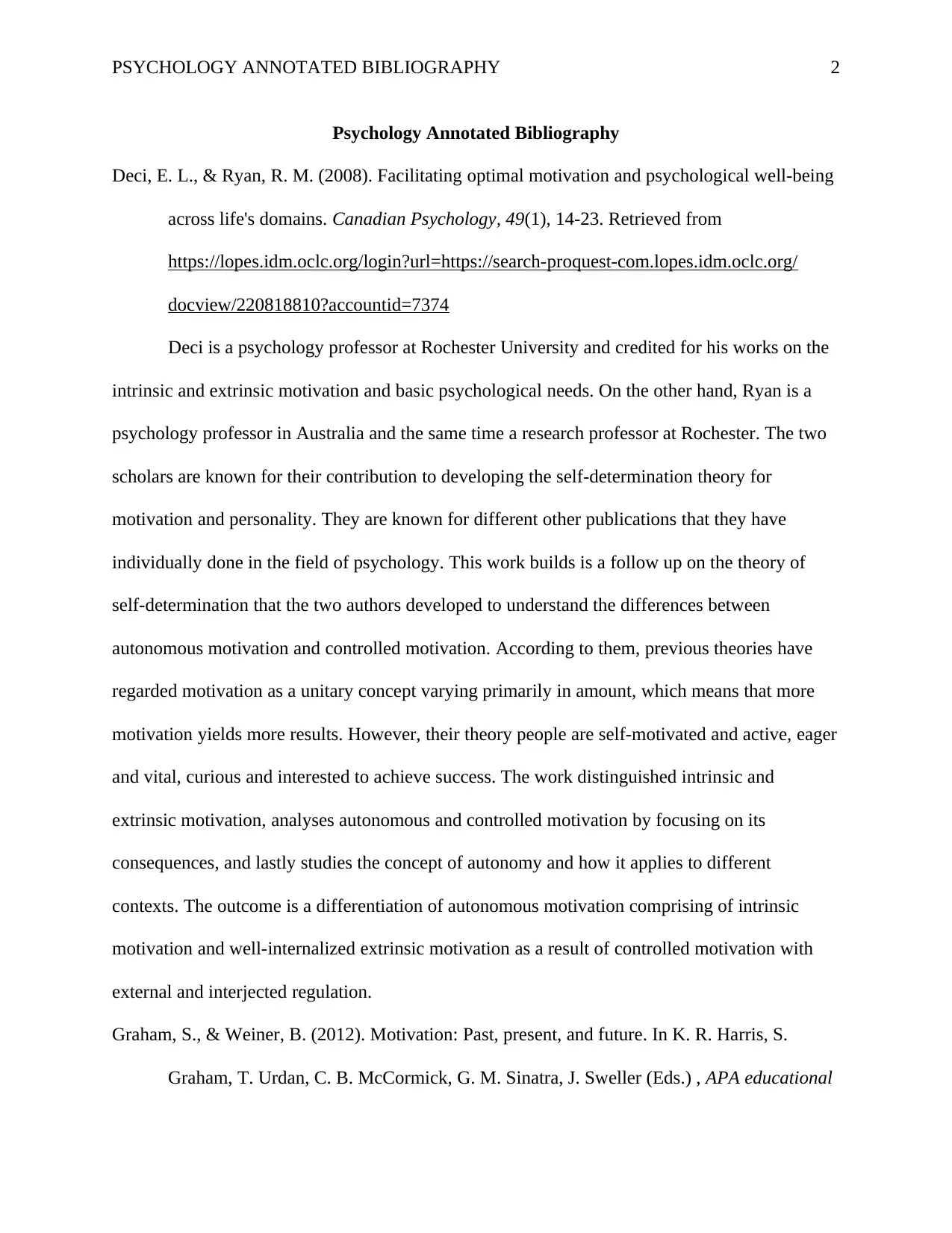
PSYCHOLOGY ANNOTATED BIBLIOGRAPHY 2
Psychology Annotated Bibliography
Deci, E. L., & Ryan, R. M. (2008). Facilitating optimal motivation and psychological well-being
across life's domains. Canadian Psychology, 49(1), 14-23. Retrieved from
https://lopes.idm.oclc.org/login?url=https://search-proquest-com.lopes.idm.oclc.org/
docview/220818810?accountid=7374
Deci is a psychology professor at Rochester University and credited for his works on the
intrinsic and extrinsic motivation and basic psychological needs. On the other hand, Ryan is a
psychology professor in Australia and the same time a research professor at Rochester. The two
scholars are known for their contribution to developing the self-determination theory for
motivation and personality. They are known for different other publications that they have
individually done in the field of psychology. This work builds is a follow up on the theory of
self-determination that the two authors developed to understand the differences between
autonomous motivation and controlled motivation. According to them, previous theories have
regarded motivation as a unitary concept varying primarily in amount, which means that more
motivation yields more results. However, their theory people are self-motivated and active, eager
and vital, curious and interested to achieve success. The work distinguished intrinsic and
extrinsic motivation, analyses autonomous and controlled motivation by focusing on its
consequences, and lastly studies the concept of autonomy and how it applies to different
contexts. The outcome is a differentiation of autonomous motivation comprising of intrinsic
motivation and well-internalized extrinsic motivation as a result of controlled motivation with
external and interjected regulation.
Graham, S., & Weiner, B. (2012). Motivation: Past, present, and future. In K. R. Harris, S.
Graham, T. Urdan, C. B. McCormick, G. M. Sinatra, J. Sweller (Eds.) , APA educational
Psychology Annotated Bibliography
Deci, E. L., & Ryan, R. M. (2008). Facilitating optimal motivation and psychological well-being
across life's domains. Canadian Psychology, 49(1), 14-23. Retrieved from
https://lopes.idm.oclc.org/login?url=https://search-proquest-com.lopes.idm.oclc.org/
docview/220818810?accountid=7374
Deci is a psychology professor at Rochester University and credited for his works on the
intrinsic and extrinsic motivation and basic psychological needs. On the other hand, Ryan is a
psychology professor in Australia and the same time a research professor at Rochester. The two
scholars are known for their contribution to developing the self-determination theory for
motivation and personality. They are known for different other publications that they have
individually done in the field of psychology. This work builds is a follow up on the theory of
self-determination that the two authors developed to understand the differences between
autonomous motivation and controlled motivation. According to them, previous theories have
regarded motivation as a unitary concept varying primarily in amount, which means that more
motivation yields more results. However, their theory people are self-motivated and active, eager
and vital, curious and interested to achieve success. The work distinguished intrinsic and
extrinsic motivation, analyses autonomous and controlled motivation by focusing on its
consequences, and lastly studies the concept of autonomy and how it applies to different
contexts. The outcome is a differentiation of autonomous motivation comprising of intrinsic
motivation and well-internalized extrinsic motivation as a result of controlled motivation with
external and interjected regulation.
Graham, S., & Weiner, B. (2012). Motivation: Past, present, and future. In K. R. Harris, S.
Graham, T. Urdan, C. B. McCormick, G. M. Sinatra, J. Sweller (Eds.) , APA educational
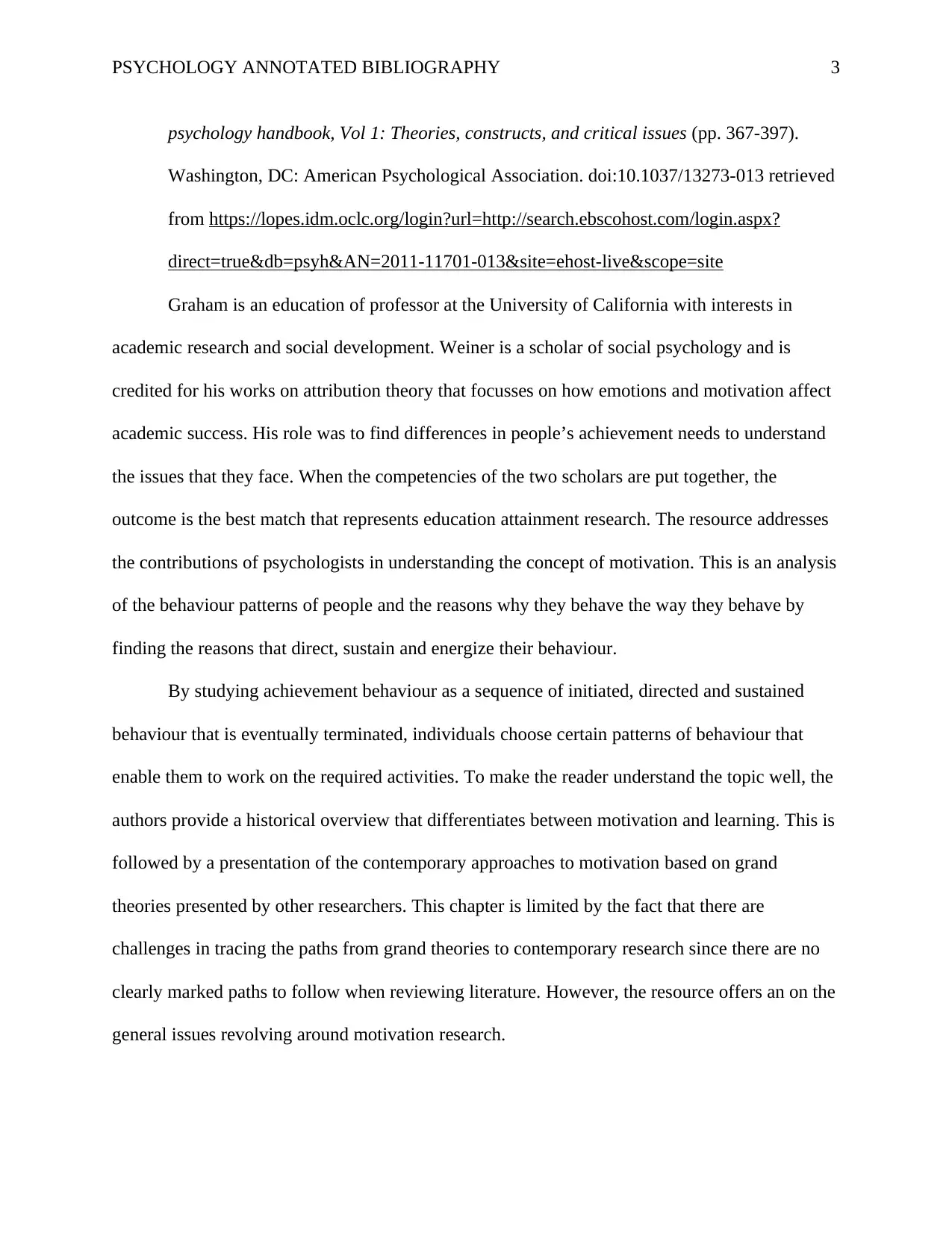
PSYCHOLOGY ANNOTATED BIBLIOGRAPHY 3
psychology handbook, Vol 1: Theories, constructs, and critical issues (pp. 367-397).
Washington, DC: American Psychological Association. doi:10.1037/13273-013 retrieved
from https://lopes.idm.oclc.org/login?url=http://search.ebscohost.com/login.aspx?
direct=true&db=psyh&AN=2011-11701-013&site=ehost-live&scope=site
Graham is an education of professor at the University of California with interests in
academic research and social development. Weiner is a scholar of social psychology and is
credited for his works on attribution theory that focusses on how emotions and motivation affect
academic success. His role was to find differences in people’s achievement needs to understand
the issues that they face. When the competencies of the two scholars are put together, the
outcome is the best match that represents education attainment research. The resource addresses
the contributions of psychologists in understanding the concept of motivation. This is an analysis
of the behaviour patterns of people and the reasons why they behave the way they behave by
finding the reasons that direct, sustain and energize their behaviour.
By studying achievement behaviour as a sequence of initiated, directed and sustained
behaviour that is eventually terminated, individuals choose certain patterns of behaviour that
enable them to work on the required activities. To make the reader understand the topic well, the
authors provide a historical overview that differentiates between motivation and learning. This is
followed by a presentation of the contemporary approaches to motivation based on grand
theories presented by other researchers. This chapter is limited by the fact that there are
challenges in tracing the paths from grand theories to contemporary research since there are no
clearly marked paths to follow when reviewing literature. However, the resource offers an on the
general issues revolving around motivation research.
psychology handbook, Vol 1: Theories, constructs, and critical issues (pp. 367-397).
Washington, DC: American Psychological Association. doi:10.1037/13273-013 retrieved
from https://lopes.idm.oclc.org/login?url=http://search.ebscohost.com/login.aspx?
direct=true&db=psyh&AN=2011-11701-013&site=ehost-live&scope=site
Graham is an education of professor at the University of California with interests in
academic research and social development. Weiner is a scholar of social psychology and is
credited for his works on attribution theory that focusses on how emotions and motivation affect
academic success. His role was to find differences in people’s achievement needs to understand
the issues that they face. When the competencies of the two scholars are put together, the
outcome is the best match that represents education attainment research. The resource addresses
the contributions of psychologists in understanding the concept of motivation. This is an analysis
of the behaviour patterns of people and the reasons why they behave the way they behave by
finding the reasons that direct, sustain and energize their behaviour.
By studying achievement behaviour as a sequence of initiated, directed and sustained
behaviour that is eventually terminated, individuals choose certain patterns of behaviour that
enable them to work on the required activities. To make the reader understand the topic well, the
authors provide a historical overview that differentiates between motivation and learning. This is
followed by a presentation of the contemporary approaches to motivation based on grand
theories presented by other researchers. This chapter is limited by the fact that there are
challenges in tracing the paths from grand theories to contemporary research since there are no
clearly marked paths to follow when reviewing literature. However, the resource offers an on the
general issues revolving around motivation research.
⊘ This is a preview!⊘
Do you want full access?
Subscribe today to unlock all pages.

Trusted by 1+ million students worldwide
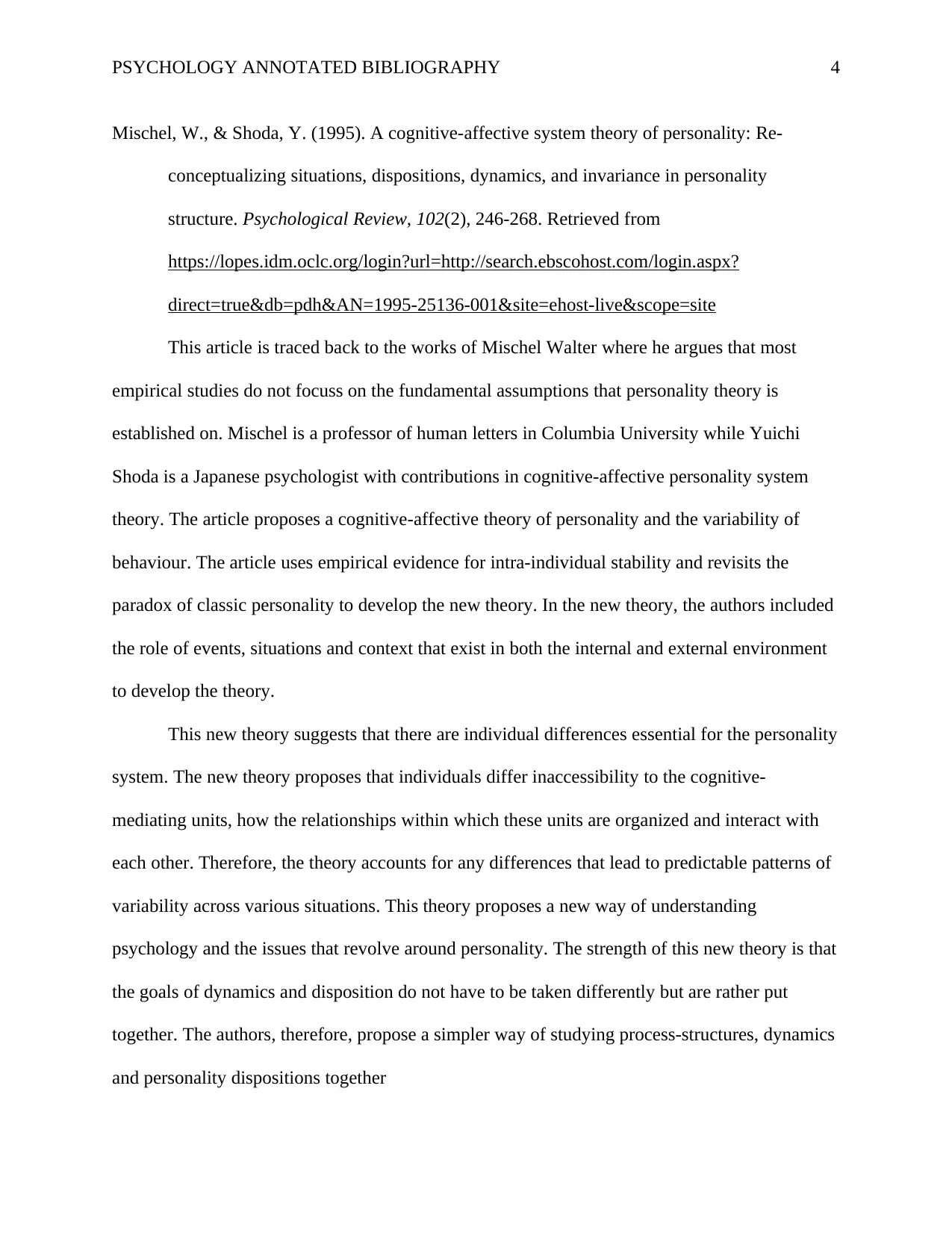
PSYCHOLOGY ANNOTATED BIBLIOGRAPHY 4
Mischel, W., & Shoda, Y. (1995). A cognitive-affective system theory of personality: Re-
conceptualizing situations, dispositions, dynamics, and invariance in personality
structure. Psychological Review, 102(2), 246-268. Retrieved from
https://lopes.idm.oclc.org/login?url=http://search.ebscohost.com/login.aspx?
direct=true&db=pdh&AN=1995-25136-001&site=ehost-live&scope=site
This article is traced back to the works of Mischel Walter where he argues that most
empirical studies do not focuss on the fundamental assumptions that personality theory is
established on. Mischel is a professor of human letters in Columbia University while Yuichi
Shoda is a Japanese psychologist with contributions in cognitive-affective personality system
theory. The article proposes a cognitive-affective theory of personality and the variability of
behaviour. The article uses empirical evidence for intra-individual stability and revisits the
paradox of classic personality to develop the new theory. In the new theory, the authors included
the role of events, situations and context that exist in both the internal and external environment
to develop the theory.
This new theory suggests that there are individual differences essential for the personality
system. The new theory proposes that individuals differ inaccessibility to the cognitive-
mediating units, how the relationships within which these units are organized and interact with
each other. Therefore, the theory accounts for any differences that lead to predictable patterns of
variability across various situations. This theory proposes a new way of understanding
psychology and the issues that revolve around personality. The strength of this new theory is that
the goals of dynamics and disposition do not have to be taken differently but are rather put
together. The authors, therefore, propose a simpler way of studying process-structures, dynamics
and personality dispositions together
Mischel, W., & Shoda, Y. (1995). A cognitive-affective system theory of personality: Re-
conceptualizing situations, dispositions, dynamics, and invariance in personality
structure. Psychological Review, 102(2), 246-268. Retrieved from
https://lopes.idm.oclc.org/login?url=http://search.ebscohost.com/login.aspx?
direct=true&db=pdh&AN=1995-25136-001&site=ehost-live&scope=site
This article is traced back to the works of Mischel Walter where he argues that most
empirical studies do not focuss on the fundamental assumptions that personality theory is
established on. Mischel is a professor of human letters in Columbia University while Yuichi
Shoda is a Japanese psychologist with contributions in cognitive-affective personality system
theory. The article proposes a cognitive-affective theory of personality and the variability of
behaviour. The article uses empirical evidence for intra-individual stability and revisits the
paradox of classic personality to develop the new theory. In the new theory, the authors included
the role of events, situations and context that exist in both the internal and external environment
to develop the theory.
This new theory suggests that there are individual differences essential for the personality
system. The new theory proposes that individuals differ inaccessibility to the cognitive-
mediating units, how the relationships within which these units are organized and interact with
each other. Therefore, the theory accounts for any differences that lead to predictable patterns of
variability across various situations. This theory proposes a new way of understanding
psychology and the issues that revolve around personality. The strength of this new theory is that
the goals of dynamics and disposition do not have to be taken differently but are rather put
together. The authors, therefore, propose a simpler way of studying process-structures, dynamics
and personality dispositions together
Paraphrase This Document
Need a fresh take? Get an instant paraphrase of this document with our AI Paraphraser
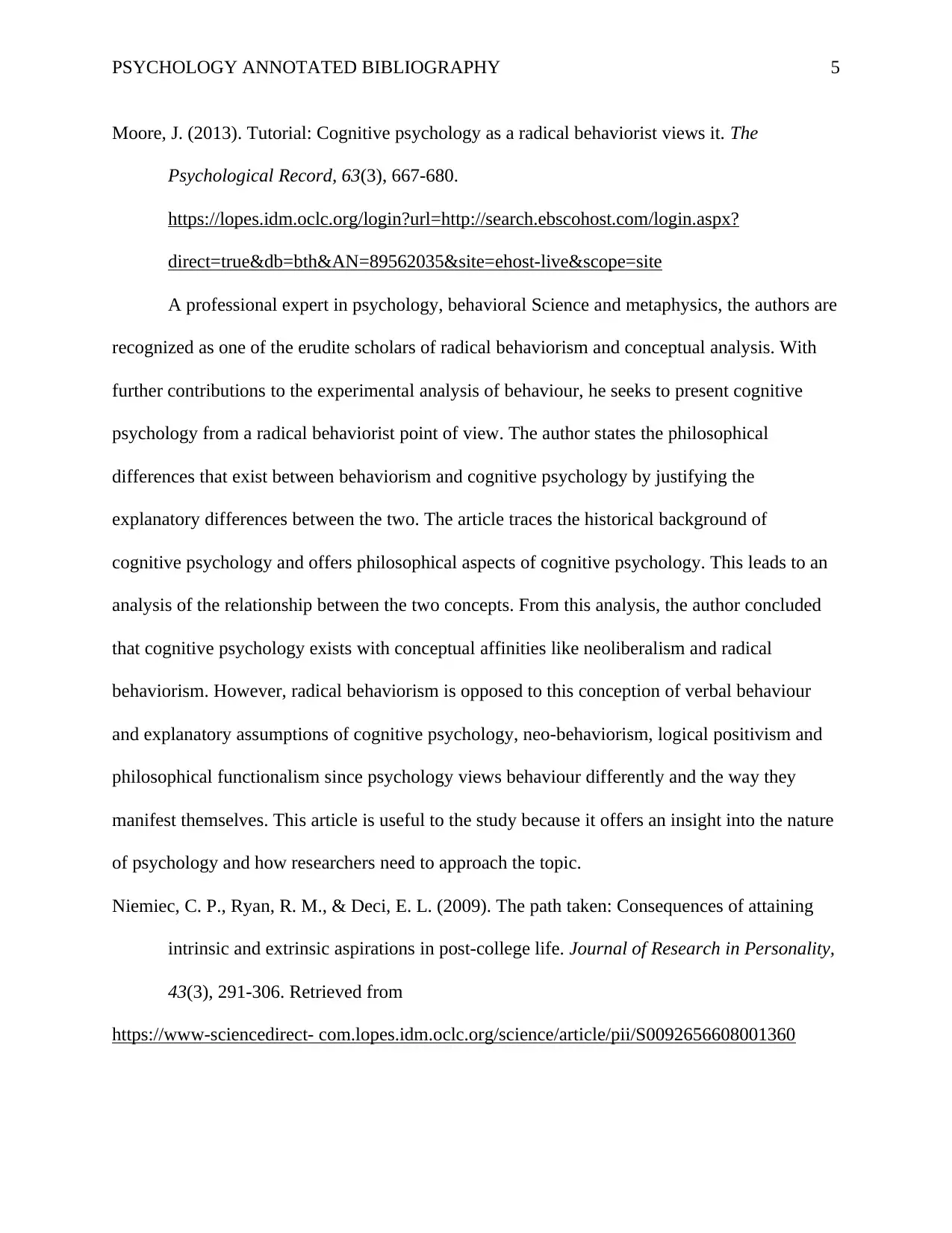
PSYCHOLOGY ANNOTATED BIBLIOGRAPHY 5
Moore, J. (2013). Tutorial: Cognitive psychology as a radical behaviorist views it. The
Psychological Record, 63(3), 667-680.
https://lopes.idm.oclc.org/login?url=http://search.ebscohost.com/login.aspx?
direct=true&db=bth&AN=89562035&site=ehost-live&scope=site
A professional expert in psychology, behavioral Science and metaphysics, the authors are
recognized as one of the erudite scholars of radical behaviorism and conceptual analysis. With
further contributions to the experimental analysis of behaviour, he seeks to present cognitive
psychology from a radical behaviorist point of view. The author states the philosophical
differences that exist between behaviorism and cognitive psychology by justifying the
explanatory differences between the two. The article traces the historical background of
cognitive psychology and offers philosophical aspects of cognitive psychology. This leads to an
analysis of the relationship between the two concepts. From this analysis, the author concluded
that cognitive psychology exists with conceptual affinities like neoliberalism and radical
behaviorism. However, radical behaviorism is opposed to this conception of verbal behaviour
and explanatory assumptions of cognitive psychology, neo-behaviorism, logical positivism and
philosophical functionalism since psychology views behaviour differently and the way they
manifest themselves. This article is useful to the study because it offers an insight into the nature
of psychology and how researchers need to approach the topic.
Niemiec, C. P., Ryan, R. M., & Deci, E. L. (2009). The path taken: Consequences of attaining
intrinsic and extrinsic aspirations in post-college life. Journal of Research in Personality,
43(3), 291-306. Retrieved from
https://www-sciencedirect- com.lopes.idm.oclc.org/science/article/pii/S0092656608001360
Moore, J. (2013). Tutorial: Cognitive psychology as a radical behaviorist views it. The
Psychological Record, 63(3), 667-680.
https://lopes.idm.oclc.org/login?url=http://search.ebscohost.com/login.aspx?
direct=true&db=bth&AN=89562035&site=ehost-live&scope=site
A professional expert in psychology, behavioral Science and metaphysics, the authors are
recognized as one of the erudite scholars of radical behaviorism and conceptual analysis. With
further contributions to the experimental analysis of behaviour, he seeks to present cognitive
psychology from a radical behaviorist point of view. The author states the philosophical
differences that exist between behaviorism and cognitive psychology by justifying the
explanatory differences between the two. The article traces the historical background of
cognitive psychology and offers philosophical aspects of cognitive psychology. This leads to an
analysis of the relationship between the two concepts. From this analysis, the author concluded
that cognitive psychology exists with conceptual affinities like neoliberalism and radical
behaviorism. However, radical behaviorism is opposed to this conception of verbal behaviour
and explanatory assumptions of cognitive psychology, neo-behaviorism, logical positivism and
philosophical functionalism since psychology views behaviour differently and the way they
manifest themselves. This article is useful to the study because it offers an insight into the nature
of psychology and how researchers need to approach the topic.
Niemiec, C. P., Ryan, R. M., & Deci, E. L. (2009). The path taken: Consequences of attaining
intrinsic and extrinsic aspirations in post-college life. Journal of Research in Personality,
43(3), 291-306. Retrieved from
https://www-sciencedirect- com.lopes.idm.oclc.org/science/article/pii/S0092656608001360
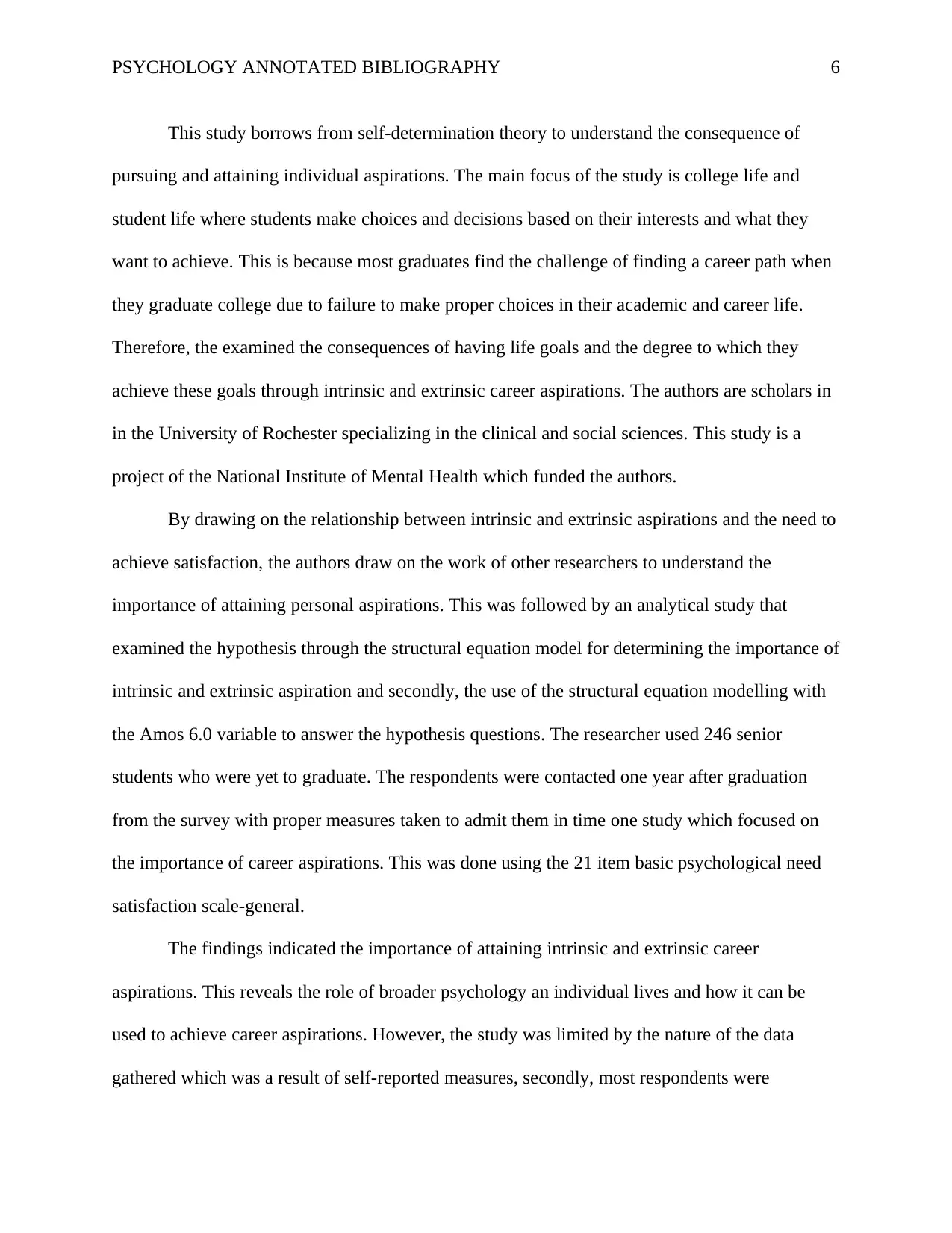
PSYCHOLOGY ANNOTATED BIBLIOGRAPHY 6
This study borrows from self-determination theory to understand the consequence of
pursuing and attaining individual aspirations. The main focus of the study is college life and
student life where students make choices and decisions based on their interests and what they
want to achieve. This is because most graduates find the challenge of finding a career path when
they graduate college due to failure to make proper choices in their academic and career life.
Therefore, the examined the consequences of having life goals and the degree to which they
achieve these goals through intrinsic and extrinsic career aspirations. The authors are scholars in
in the University of Rochester specializing in the clinical and social sciences. This study is a
project of the National Institute of Mental Health which funded the authors.
By drawing on the relationship between intrinsic and extrinsic aspirations and the need to
achieve satisfaction, the authors draw on the work of other researchers to understand the
importance of attaining personal aspirations. This was followed by an analytical study that
examined the hypothesis through the structural equation model for determining the importance of
intrinsic and extrinsic aspiration and secondly, the use of the structural equation modelling with
the Amos 6.0 variable to answer the hypothesis questions. The researcher used 246 senior
students who were yet to graduate. The respondents were contacted one year after graduation
from the survey with proper measures taken to admit them in time one study which focused on
the importance of career aspirations. This was done using the 21 item basic psychological need
satisfaction scale-general.
The findings indicated the importance of attaining intrinsic and extrinsic career
aspirations. This reveals the role of broader psychology an individual lives and how it can be
used to achieve career aspirations. However, the study was limited by the nature of the data
gathered which was a result of self-reported measures, secondly, most respondents were
This study borrows from self-determination theory to understand the consequence of
pursuing and attaining individual aspirations. The main focus of the study is college life and
student life where students make choices and decisions based on their interests and what they
want to achieve. This is because most graduates find the challenge of finding a career path when
they graduate college due to failure to make proper choices in their academic and career life.
Therefore, the examined the consequences of having life goals and the degree to which they
achieve these goals through intrinsic and extrinsic career aspirations. The authors are scholars in
in the University of Rochester specializing in the clinical and social sciences. This study is a
project of the National Institute of Mental Health which funded the authors.
By drawing on the relationship between intrinsic and extrinsic aspirations and the need to
achieve satisfaction, the authors draw on the work of other researchers to understand the
importance of attaining personal aspirations. This was followed by an analytical study that
examined the hypothesis through the structural equation model for determining the importance of
intrinsic and extrinsic aspiration and secondly, the use of the structural equation modelling with
the Amos 6.0 variable to answer the hypothesis questions. The researcher used 246 senior
students who were yet to graduate. The respondents were contacted one year after graduation
from the survey with proper measures taken to admit them in time one study which focused on
the importance of career aspirations. This was done using the 21 item basic psychological need
satisfaction scale-general.
The findings indicated the importance of attaining intrinsic and extrinsic career
aspirations. This reveals the role of broader psychology an individual lives and how it can be
used to achieve career aspirations. However, the study was limited by the nature of the data
gathered which was a result of self-reported measures, secondly, most respondents were
⊘ This is a preview!⊘
Do you want full access?
Subscribe today to unlock all pages.

Trusted by 1+ million students worldwide

PSYCHOLOGY ANNOTATED BIBLIOGRAPHY 7
Caucasian Americans thus limiting the diversity of the study and lastly, the findings were
correlational thus limiting the conclusion. However, the study concluded that supportive context
needs to be established for intrinsic aspirations to improve psychological health.
Caucasian Americans thus limiting the diversity of the study and lastly, the findings were
correlational thus limiting the conclusion. However, the study concluded that supportive context
needs to be established for intrinsic aspirations to improve psychological health.
Paraphrase This Document
Need a fresh take? Get an instant paraphrase of this document with our AI Paraphraser
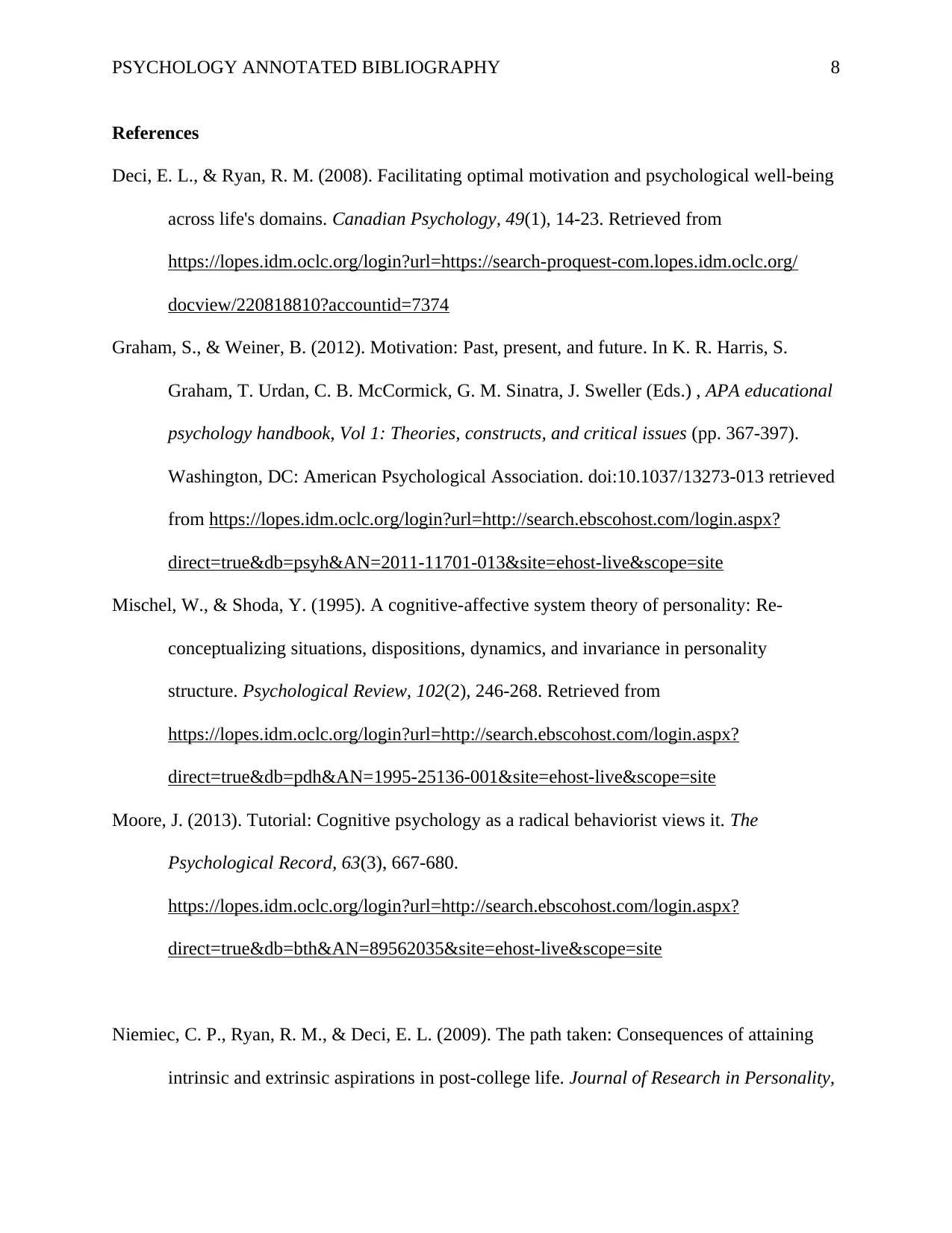
PSYCHOLOGY ANNOTATED BIBLIOGRAPHY 8
References
Deci, E. L., & Ryan, R. M. (2008). Facilitating optimal motivation and psychological well-being
across life's domains. Canadian Psychology, 49(1), 14-23. Retrieved from
https://lopes.idm.oclc.org/login?url=https://search-proquest-com.lopes.idm.oclc.org/
docview/220818810?accountid=7374
Graham, S., & Weiner, B. (2012). Motivation: Past, present, and future. In K. R. Harris, S.
Graham, T. Urdan, C. B. McCormick, G. M. Sinatra, J. Sweller (Eds.) , APA educational
psychology handbook, Vol 1: Theories, constructs, and critical issues (pp. 367-397).
Washington, DC: American Psychological Association. doi:10.1037/13273-013 retrieved
from https://lopes.idm.oclc.org/login?url=http://search.ebscohost.com/login.aspx?
direct=true&db=psyh&AN=2011-11701-013&site=ehost-live&scope=site
Mischel, W., & Shoda, Y. (1995). A cognitive-affective system theory of personality: Re-
conceptualizing situations, dispositions, dynamics, and invariance in personality
structure. Psychological Review, 102(2), 246-268. Retrieved from
https://lopes.idm.oclc.org/login?url=http://search.ebscohost.com/login.aspx?
direct=true&db=pdh&AN=1995-25136-001&site=ehost-live&scope=site
Moore, J. (2013). Tutorial: Cognitive psychology as a radical behaviorist views it. The
Psychological Record, 63(3), 667-680.
https://lopes.idm.oclc.org/login?url=http://search.ebscohost.com/login.aspx?
direct=true&db=bth&AN=89562035&site=ehost-live&scope=site
Niemiec, C. P., Ryan, R. M., & Deci, E. L. (2009). The path taken: Consequences of attaining
intrinsic and extrinsic aspirations in post-college life. Journal of Research in Personality,
References
Deci, E. L., & Ryan, R. M. (2008). Facilitating optimal motivation and psychological well-being
across life's domains. Canadian Psychology, 49(1), 14-23. Retrieved from
https://lopes.idm.oclc.org/login?url=https://search-proquest-com.lopes.idm.oclc.org/
docview/220818810?accountid=7374
Graham, S., & Weiner, B. (2012). Motivation: Past, present, and future. In K. R. Harris, S.
Graham, T. Urdan, C. B. McCormick, G. M. Sinatra, J. Sweller (Eds.) , APA educational
psychology handbook, Vol 1: Theories, constructs, and critical issues (pp. 367-397).
Washington, DC: American Psychological Association. doi:10.1037/13273-013 retrieved
from https://lopes.idm.oclc.org/login?url=http://search.ebscohost.com/login.aspx?
direct=true&db=psyh&AN=2011-11701-013&site=ehost-live&scope=site
Mischel, W., & Shoda, Y. (1995). A cognitive-affective system theory of personality: Re-
conceptualizing situations, dispositions, dynamics, and invariance in personality
structure. Psychological Review, 102(2), 246-268. Retrieved from
https://lopes.idm.oclc.org/login?url=http://search.ebscohost.com/login.aspx?
direct=true&db=pdh&AN=1995-25136-001&site=ehost-live&scope=site
Moore, J. (2013). Tutorial: Cognitive psychology as a radical behaviorist views it. The
Psychological Record, 63(3), 667-680.
https://lopes.idm.oclc.org/login?url=http://search.ebscohost.com/login.aspx?
direct=true&db=bth&AN=89562035&site=ehost-live&scope=site
Niemiec, C. P., Ryan, R. M., & Deci, E. L. (2009). The path taken: Consequences of attaining
intrinsic and extrinsic aspirations in post-college life. Journal of Research in Personality,

PSYCHOLOGY ANNOTATED BIBLIOGRAPHY 9
43(3), 291-306. Retrieved from
https://www-sciencedirect-com.lopes.idm.oclc.org/science/article/pii/
S0092656608001360
43(3), 291-306. Retrieved from
https://www-sciencedirect-com.lopes.idm.oclc.org/science/article/pii/
S0092656608001360
⊘ This is a preview!⊘
Do you want full access?
Subscribe today to unlock all pages.

Trusted by 1+ million students worldwide
1 out of 9
Your All-in-One AI-Powered Toolkit for Academic Success.
+13062052269
info@desklib.com
Available 24*7 on WhatsApp / Email
![[object Object]](/_next/static/media/star-bottom.7253800d.svg)
Unlock your academic potential
Copyright © 2020–2026 A2Z Services. All Rights Reserved. Developed and managed by ZUCOL.


